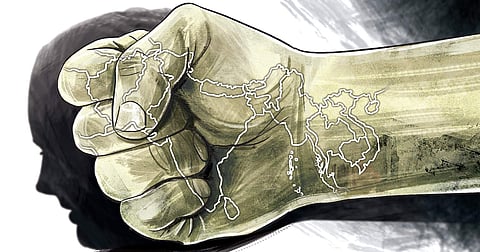

Since early October, India’s attention has been focused on a snowballing sequence of revelations of workplace sexual harassment. We now have conversations about how common this is, why women hesitate to share them and the shortcomings in the way due process works. This constant discussion of gender-based violence seems to suggest public education around gender-based violence would now be easier, if not redundant.
However, a short conversation on the issue quickly reveals how entrenched patriarchy is and with it, the normalisation of violence in thought, speech and deed. Take the ubiquitous workshop question: How do you protect men from the abuse of gender-based violence laws? It is often a woman who asks this. We raise our girls to take care of the men around them. We diligently protect patriarchy even at a personal cost.The conditioning has been evident in the discussions that have followed the 2018 #MeToo revelations. Marginalised in public conversations, even those about gender issues, women are ambivalent in private conversations. They seek validation for the empathy they feel, or when repressed emotions are triggered, but their socialisation is to express concern about the discomfort of men.
This resilient system of social domination by men simply aligns itself with every other oppressive hierarchy, reinforcing it and being reinforced in turn. In India, this means caste, ethnic and religious community and class. Each grants privilege and impunity to the powerful, and patriarchy reinforces this for men, socialising women to be allies and defenders at their own cost. It is impossible to enumerate the possibilities for violence and exploitation that are created by these intersections, and each of us is conditioned to play our part in this system.
Confronting the violence of patriarchy makes it impossible to ignore other kinds of privilege that we enjoy. Marxist feminists have always pointed to the importance of overlapping social structures in undermining and reinforcing privilege and vulnerability. This intersectionality largely characterises the feminism of young women today. They understand clearly that you cannot confront one kind of hierarchy without facing up even to those that benefit you. Where we once thought that it was important to first fight the structures and then speak about issues of personal injustice like menstruation taboos, they teach us how to live the personal as political and show us how to fight both fronts together.
We use the terms ‘rape culture’ and a ‘culture of impunity’ to capture how deeply embedded our acceptance of violence as normal is. We are unwilling to look an abuser in the eye and call them out if it will cause ripples in our family or social circle or community. We are willing to believe that forms of social control exist for our good—whatever that is—and to buy the idea that all departures are destabilising to society. Violence and injustice must be borne as the price of some elusive and illusory good. We pay the price because that is what we learn. We are all implicated in a social system that depends on some people controlling others through the violence of norms, rituals, political power, economic exclusion and sexual harassment and rape. When we have the chance to learn but we look away, we are perpetrators.
Patriarchy’s gender norms are unrealistic and an unjust burden, not just for women and non-binary persons but also for men who may not all conform in appearance, orientation or expression. What is considered the masculine ideal comes to be defined in terms of violence and domination, which has terrible consequences not only in interpersonal terms but also in political terms. Patriarchy trains us well to be obedient, to value strong male leadership and to define that strength in terms of the ability to bully, use violence and silence dissent. Patriarchy and militarisation have a symbiotic relationship, and democracy is a casualty.
Beyond the media spotlight, other forms of violence persist. Many girls still face discrimination in care and access to opportunity, and have to abide by life-choices that are made for them. We have begun teaching children ‘good touch, bad touch’ but we still say to them, “Baby, give uncle or aunty a kiss,” with complete disregard to their wishes or consent. Down the line, we admonish young women, “You should have said ‘no’ more firmly.”
Surveys repeatedly show that a large percentage of women believe domestic violence to be justified. Young people today appear to be unaware that dowry is prohibited by law, and in any case, we have developed euphemisms that allow the practice to endure. Our thinking has hardly changed. Today’s workplace sexual harassment discussions centre on organised, corporate workspaces. However, we have not found a way to make justice accessible to the majority of working women who are outside of these.
Newspapers bring to light gendered caste-based killings that penalise young people for autonomously choosing their partners, but our persistent everyday violence of caste discrimination is invisible to us. Women who step out of patriarchy’s prescribed roles to work in the public sphere, especially when they express dissent, face rape and murder threats. We do not see, and so we perpetuate.
Sexual and gender-based violence is not just a women’s issue. It is an expression of everything that is wrong with the world around us because it is used to express and buttress every kind of inequality and in our acceptance of its normality, it trains us to know and obediently embrace our place as second-class citizens.
Swarna Rajagopalan
has been part of the Prajnya 16 Days Campaign against Gender Violence since 2008, which starts on November 25 every year
Email: swr.prajnya@gmail.com